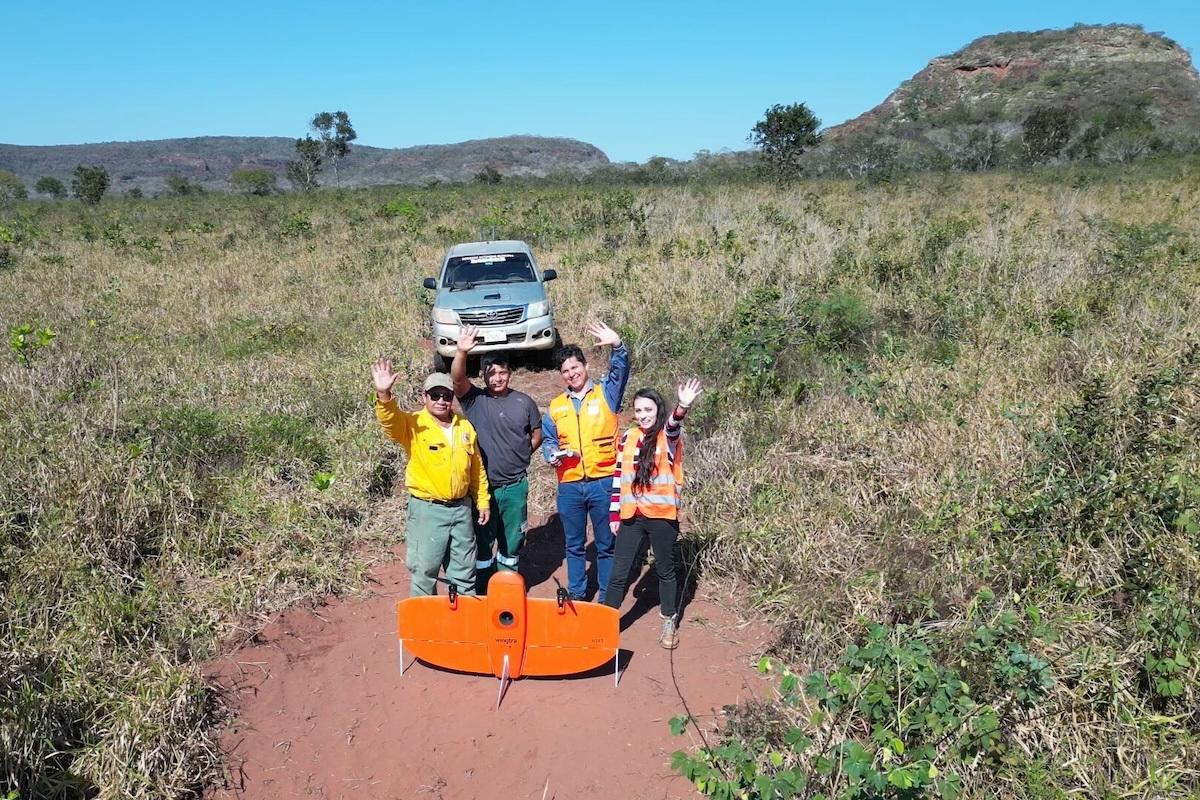
Building Capacity to Turn Data into Action: Bolivia Flying Labs’ Fight Against Forest Fires
October 25th, 2024

A pebble dropped into a pond may seem inconsequential at first glance. But upon closer inspection, the ripples extend far beyond the initial splash, influencing the surrounding environment in meaningful ways. Similarly, a microgrant can transform a small local project into significant opportunities and impactful outcomes. With the Turning Data into Action (TDIA) microgrant approach, WeRobotics extends to Flying Labs critical financial, technical, strategic, and communication support that allows Flying Labs to turn a small project into far-reaching impact and a cascade of opportunities.
The increasing frequency and intensity of forest fires in Bolivia has placed significant stress on natural ecosystems, biodiversity, and local communities. As climate change exacerbates these risks, calls for innovative solutions to address the challenge have gotten louder and more urgent.
Bolivia Flying Labs had already been supporting fire-affected communities with essential supplies like water, food, and medicine. However, there was a recognition that technology could be used to address the core issue more effectively. When the opportunity to undertake a project arose, Bolivia Flying Labs answered the call, launching the Firehawk Project. Supported by WeRobotics’ Turning Data into Action (TDIA) microgrant, they set out to utilize drones and drone data to map and monitor forest areas, providing vital information to identify high-risk zones susceptible to fires.
Capacity Building in Action
Capacity building turned out to be a foundational aspect of this project. With little prior experience with a project of this scope, the team had to build their skills from the ground up. They bolstered their drone operation and data processing skills, and team member Fernando Chávez received specialized training from Wingtra, which enabled him to take on the operational side of the project, including conducting drone flights and visiting rural areas impacted by fires. Additionally, Erika Lopez, former head of Strategic Planning at Bolivia Flying Labs, took the TDIA programme training to learn its tools and methodology and share with the rest of the team.
What they learnt was that just as important as improving their technical know-how was improving their project management and teamwork. Monitoring large forest areas is a complex task that requires significant resources. It took the team two days to survey 200 hectares and two weeks thereafter to process the data they collected. Held up against the reality that Bolivia loses millions of hectares of vegetation to fires almost every year, this experience led them to realize that if they wanted to expand their project they needed to improve their logistical planning to cover larger areas more efficiently.
We now know that to scale this project, we need better logistics, data processing capabilities, and more advanced technology.
— Fernando Chávez, Software Research Lead, Bolivia Flying Labs
In the early stages, the team faced difficulties coordinating tasks and responsibilities. It wasn’t a matter of only improving each team member’s capacity to carry out their tasks but also of coming up with a clear plan together, opening channels of communication, and supporting one another to connect the dots and accomplish their unified vision. Though they pulled their expertises and efforts together to optimize their processes, they point out that organizing tasks from the outset would have made things run more smoothly, and the learning experience is something they will take with them into future initiatives.
If we let just one person do it, we are not able to deliver the whole process. We learned that we need to get everybody involved.
— René Salomón Vargas, Director, Bolivia Flying Labs
As a team, we are volunteers, so to be more efficient we needed to organize all our tasks and responsibilities more precisely. It’s a very good thing that we can learn this as a team.
— Ronald Beltrán, Project Manager, Bolivia Flying Labs
Building Stronger Partnerships through Stakeholder Engagement
As with all Turning Data into Action projects, collaboration with local stakeholders was an indispensable part of Bolivia Flying Labs’ project. These stakeholders included municipal authorities, the National Forest Authority, and local communities who were directly impacted by forest fires. Working with these groups not only helped with logistics but also built a sense of ownership and collaboration in the fight against forest fires.
The local stakeholders were very open to the project because they suffer from forest fires each year. They provided us with valuable data about the region, including shapefiles and geodatabases that they don’t typically share with the public. This open exchange of information was key to making the project a success.
— Fernando Chávez, Software Research Lead, Bolivia Flying Labs
Engagement with the local authorities was also invaluable in not just obtaining the permissions required for drone flights but also in ensuring that the data collected could be used effectively. Working with national authorities like the ABT (Forest and Land Authority) and SNA (National Service of Aerophotogrametry) involved navigating complex bureaucracy, an experience that foregrounded the importance of understanding local governance structures when implementing projects in local communities. It took the team, especially Erika Lopez, a month and a half to get the necessary permissions, but in the process, they learned how to effectively present projects to the authorities and what was required in order to streamline future approvals. In this experience lies another key capacity-building outcome: the team gained valuable insights into working with government bodies, an essential skill for any nonprofit looking to use drones for social good.
Although stakeholder engagement is rarely without significant challenges, building trust with local community members and local authorities is what ensures that the project outcomes will be relevant and useful to those on the ground – which, ultimately, is how to turn data into action and create lasting impact.

A Future Built on Capacity and Collaboration
As Bolivia Flying Labs anticipates the expansion of the Firehawk Project, the team is committed to continuing their capacity-building efforts. They plan to train more team members in data processing and analysis, particularly regarding forest fire prevention, while also building partnerships with universities and other organizations to increase their expertise.
We will work closely with municipal governments over the next three years, teaching how to fly, how to understand drone data, and how to improve local capacities. This will make a big difference in the way we approach forest fires.
— René Salomón Vargas, Director, Bolivia Flying Labs
The team’s efforts have already shown promising results. In 2023, the areas monitored through their project as well as the surrounding landscape remained untouched by forest fires. Additionally, the local communities were better prepared in the event a fire broke out. This year has seen forest fires in Bolivia jump to a record high, with 10 million hectares of land and thousands of lives affected. The need for investing in localized, community-driven solutions to address this crisis is more critical than ever.
Bolivia Flying Labs’ Firehawk Project serves as a model for how local experts can use emerging technologies, community engagement, and internal capacity building to tackle this challenge head-on. With increased partnership and resources, this as well as future projects can have an even greater impact. Dive into their interactive ArcGIS story map and explore their blog to learn more about their work using drones to realize a Bolivia without forest fires and how you can support it.
Category(s):
Location(s):
Recent Articles

